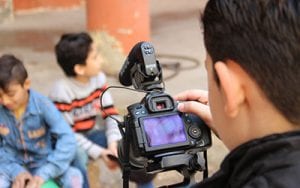Giving Syrian child refugees a voice through film
By By Guest Blogger, on 24 May 2017
The Refugee Film Project was founded by three UCL alumni: Aphra Evans (BA Latin American Studies), Shyam Jones (BSc Psychology) and Michael McGovern (BA European Social & Political Studies), to support Syrian child refugees.
Written by Aphra Evans
 The Refugee Film Project teaches Syrian child refugees the art of filmmaking, and it was founded thanks to a serendipitous series of events involving three UCL alumni.
The Refugee Film Project teaches Syrian child refugees the art of filmmaking, and it was founded thanks to a serendipitous series of events involving three UCL alumni.
Michael McGovern works for an NGO called SB OverSeas which operates in Syria and Lebanon. Wanting to help, I volunteered as a teacher in their school in Beirut for children living in Shatila refugee camp. Soon after, I was contacted by Shyam Jones, a filmmaker who suggested we collaborate. Before long, the Refugee Film Project was born.
Shyam and I wanted to give the children a creative outlet that the school could not provide, and teach them technical skills as well as life skills such as teamwork, cooperation and leadership. By being at the helm of the project, the children built their confidence, self-esteem and sense of self-worth. Meanwhile, Shyam and I had a great time harnessing the bold personalities of the kids on film.
 The children dreamt up stories and characters, had them made into scripts, picked costumes and locations, used a camera and tripod with great finesse, and then watched themselves on screen in our makeshift cinema. If nothing else, with professional equipment and a team of three adults at their beck and call they felt pretty important, and the project took them out of the camp where they could not play on the streets for the danger it presented.
The children dreamt up stories and characters, had them made into scripts, picked costumes and locations, used a camera and tripod with great finesse, and then watched themselves on screen in our makeshift cinema. If nothing else, with professional equipment and a team of three adults at their beck and call they felt pretty important, and the project took them out of the camp where they could not play on the streets for the danger it presented.
Slow but steady progress
At the beginning, the children could not think of any ideas for a film. At school there were just 45 minutes a week devoted to creative endeavours (involving pencils and a piece of A4), so we had to work through a creative blockage. Film by film, the ideas multiplied. By the end, they were coming so thick and fast I had trouble writing them down.
Perhaps unsurprisingly, many were analogous to the life-altering experience of being a refugee. One story was of a village that had to be re-won, another about a king being unfair to his subjects. Violence and the divide between rich and poor were recurring themes, in their ideas as much as their lives. We let them tell the tales they wanted, as we firmly believed film was a means to process their trauma.
Shatila’s got talent
 We were lucky to work with some very gifted children. Tahani, 12, was a fantastic actor who needed no direction and had an impressive knack for remembering dialogue. Moustafa, 11, learnt his way around a camera quicker than we thought possible. For one music video, Hanadi, 15, alternated between rapping, singing and playing the oud with ease.
We were lucky to work with some very gifted children. Tahani, 12, was a fantastic actor who needed no direction and had an impressive knack for remembering dialogue. Moustafa, 11, learnt his way around a camera quicker than we thought possible. For one music video, Hanadi, 15, alternated between rapping, singing and playing the oud with ease.
More important than showcasing these talents, however, was how much the kids obviously enjoyed the course. They were constantly suppressing smiles while acting (which make their films all the more enjoyable to watch), and they would turn up at school with enthusiasm at 9am on a Sunday. One of them, Khaled, 14, even said he might work with us again when he was a grown-up actor!
Far from over
Our six-week course in Lebanon was merely the project’s first iteration. We are planning to repeat it in partnership with an NGO called SAWA that works in Lebanon’s Beqaa valley, home to half a million refugees living in tents. But this venture, as our last one, is dependent on the generosity of our crowdfunders.
The odds are stacked so highly against the 2.5 million Syrian child refugees that humanitarian organisations fear they will become a ‘lost generation’. But with the right resources they still have the chance to be children. And I hope we can find the funds to continue giving them an outlet for their energy, happiness and big personalities – on the big screen.
All images courtesy of the Refugee Film Project.
 Close
Close

